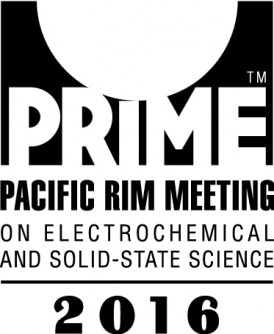Sep 15 2016
Three scientific societies will hold their joint scientific meeting, known as PRiME 2016, from Oct. 2-7, in Honolulu, HI.

This is the largest, most significant research conference of its kind in the world, and would not be possible without the joint effort of The Electrochemical Society, The Electrochemical Society of Japan, and our newest partner, The Korean Electrochemical Society. PRiME 2016 will include 56 topical symposia and 4,182 technical presentations – including the 6th International Electrochemical Energy Summit and a celebration of the 25th anniversary of the lithium-ion battery.
This year marks PRiME’s seventh return to the island of Oahu. The first Pacific Rim meeting, held in 1987, began to build what would become a major conference for the discussion of interdisciplinary research from around the world, ranging from topics in renewable energy and water sanitation to biomedical and communication technologies.
Below are some programing highlights. For more information, email [email protected].
25th Anniversary of the Lithium-ion Battery
(Sunday, Oct. 2)
The impact that the development of the Li-ion battery has made on society cannot be overemphasized. From powering medical devices to enabling hand-held electronics and even providing potential storage for a renewable grid, Li-ion technology has revolutionized the way we think about energy. PRiME 2016 will celebrate the 25th anniversary of this technology by hosting talks by some of the pioneering scientists who helped transform Li-ion technology from a laboratory curiosity into the backbone for many devices.
The symposium will feature daylong plenary lectures and an evening reception and talk by Yoshio Nishi, former employee of Sony. Other speakers include John B. Goodenough, widely recognized for his role in the development of the rechargeable Li-ion battery; M. Stanley Whittingham, a key figure in battery technology whose developments allowed Exxon to commercialize the first rechargeable Li-ion battery; Michael Thackeray, known for his identification of new cathodes that led to advances in Lithium technology; Zempachi Ogumi, recognized for his work focusing on interfacial phenomena in Li-ion batteries and fuel cells; and Martin Winter, who has focused on Li-ion R&D for nearly 25 years.
6th International Electrochemical Energy Summit
(Sunday, Oct. 2)
With population growth and industrialization, global energy needs continue to rise. The 6th International Electrochemical Energy Summit will be focused on Recent Progress in Renewable Energy Generation, Distribution and Storage – facilitating interactions and fostering the exchange of ideas between leading policy makers, researchers, and energy experts about society’s needs and technological energy solutions through a variety of formats, including: keynote presentations, poster sessions, and networking opportunities.
Speakers will include Mark Glick (Hawaii State Energy Office), Robert K. Dixon (U.S. Department of Energy), Eiji Ohira (New Energy and Industrial Technology Development Organization), and Won-Young Lee (Korea Institute of Energy Research).
Photoelectrochemical Cells for the Generation of Electricity and Fuels from Sunlight
(Monday, Oct. 3)
Michael Graetzel, pioneer in the field of energy conversion, will deliver a talk describing his research on the development of nanostructured systems to convert sun to electricity and fuels, all taking inspiration from green plant photosynthesis.
Advanced Materials Diagnosis and Characterization for Enabling High Energy Long Life Rechargeable Batteries
(Tuesday, Oct. 4)
This year’s winner of the ECS Charles W. Tobias Young Investigator Award, Y. Shirley Meng, will discuss her recently published research into understanding how batteries work at the smallest-scale in order to create better batteries and ultimately combat the effects of greenhouse gases.
Alzheimer Disease and Oxidative Stress: Thou Shalt not Breathe nor Think!
(Monday, Oct. 3)
World-renowned scientist Christian Amatore will discuss a new mechanism based on analytical measurements that could give novel insight into Alzheimer disease.
Mixed Potential Sensors for Hydrogen Safety and Automotive Applications
(Wednesday, Oct. 5)
Los Alamos National Laboratory researcher, Rangachary Mukundan, will talk about the evolution of sensors and how hydrogen safety sensors could help accelerate a sustainable automotive industry and implement new hydrogen fueling stations across the country.
Other highlights include over 50 symposia in the following areas:
- Batteries and energy storage
- Carbon nanostructures and devices
- Corrosion science and technology
- Dielectric science and materials
- Electrochemical/electroless deposition
- Electrochemical engineering
- Electronic materials and processing
- Electronic and photonic devices and systems
- Fuel cells, electrolyzers, and energy conversion
- Luminescence and display materials, devices, and processing
- Organic and bioelectrochemistry
- Physical and analytical electrochemistry, electrocatalysis, and photoelectrochemistry
- Sensors
Media Registration
Free registration is available to credentialed representatives of the press. Please email ECS Marketing and Communications Director, Rob Gerth ([email protected]), for further information.